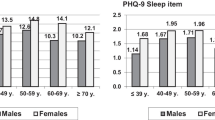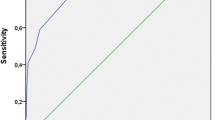Abstract
In order to effectively study the population experiencing insomnia, it is important to identify reliable and valid tools to measure sleep that can be administered in the home setting. The purpose of this study was to assess psychometric properties for the Chinese version of the Pittsburgh Sleep Quality Index (CPSQI) in community-dwelling adults with primary insomnia. The CPSQI had an overall reliability coefficient of 0.82 –0.83 for all subjects. ‘Subjective sleep quality’ was the component most highly correlated with the global score. Overall, the CPSQI showed acceptable test–retest reliability over a 14- to 21-day interval with a coefficient of 0.85 for all subjects and 0.77 for primary insomniacs. The two contrasting groups had significantly different global and component scores. A CPSQI of greater than 5 yielded a sensitivity and specificity of 98 and 55% in primary insomniacs vs. controls. A CPSQI of greater than 6 resulted in a sensitivity and specificity of 90 and 67%. Results suggest that the CPSQI is a psychometrically sound measure of sleep quality and disturbance for patients with primary insomnia. It may not be an effective screening tool because of its low specificity, but it can be a sensitive, reliable, and valid outcome assessment tool for use in community-based studies of primary insomnia
Similar content being viewed by others
References
CA. Espie (2002) ArticleTitleInsomnia: Conceptual issues in the development, persistence, and treatment of sleep disorder in adults Annu Rev Psychol 53 215–243 Occurrence Handle10.1146/annurev.psych.53.100901.135243 Occurrence Handle11752485
S Ancoli-Israel T. Roth (1999) ArticleTitleCharacteristics of insomnia in the United States: Results of the 1991 National Sleep Foundation Survey I. Sleep 22 IssueIDSuppl 2 S347–S353
CY Li PC Chen FC Sung RS. Lin (2002) ArticleTitleResidential exposure to power frequency magnetic field and sleep disorders among women in an urban community of northern Taiwan Sleep 25 428–432 Occurrence Handle12071544
GK Zammit J Weiner N Damato GP Sillup CA. McMillan (1999) ArticleTitleQuality of life in people with insomnia Sleep 22 IssueID(Suppl 2 S379–85 Occurrence Handle10394611
D Leger K Scheuermaier P Philip M Paillard C. Guilleminault (2001) ArticleTitleSF-36: Evaluation of quality of life in severe and mild insomniacs compared with good sleepers Psychosom Med 63 49–55 Occurrence Handle11211064
CM 6 Morin PJ Hauri CA Espie AJ Spielman DJ Buysse RR. Bootzin (1999) ArticleTitleNonpharmacologic treatment of chronic insomnia. An American Academy of Sleep Medicine review Sleep 22 1134–1156 Occurrence Handle10617176
MT Smith ML Perlis A Park et al. (2002) ArticleTitleComparative meta-analysis of pharmacotherapy and behavior therapy for persistent insomnia Am J Psychiatry 159 5–11 Occurrence Handle10.1176/appi.ajp.159.1.5 Occurrence Handle11772681
DJ Buysse CF Reynolds SuffixIII TH Monk SR Berman DJ. Kupfer (1989) ArticleTitleThe Pittsburgh Sleep Quality Index: A new instrument for psychiatric practice and research Psychiatry Res 28 193–213 Occurrence Handle10.1016/0165-1781(89)90047-4 Occurrence Handle2748771
DJ Buysse CF Reynolds SuffixIII TH Monk CC Hoch AL Yeager DJ. Kupfer (1991) ArticleTitleQuantification of subjective sleep quality in healthy elderly men and women using the Pittsburgh Sleep Quality Index (PSQI) Sleep 14 331–338 Occurrence Handle1947597
JS Carpenter MA. Andrykowski (1998) ArticleTitlePsychometric evaluation of the Pittsburgh Sleep Quality Index J Psychosom Res 45 5–13 Occurrence Handle10.1016/S0022-3999(97)00298-5 Occurrence Handle9720850
J Backhaus K Junghanns A Broocks D Riemann F. Hohagen (2002) ArticleTitleTest–retest reliability and validity of the Pittsburgh Sleep Quality Index in primary insomnia Psychosom Res 53 737–740 Occurrence Handle10.1016/S0022-3999(02)00330-6
InstitutionalAuthorNameAmerican Psychology Association (1994) Diagnosis and Statistical Manual of Mental Disorders EditionNumber4 American Psychiatric Association Washington, D. C. 551–607
TA Cheng P. Williams (1986) ArticleTitleThe design and development of a screening questionnaire (CHQ) for use in community studies of mental disorders in Taiwan Psychol Med 16 415–422 Occurrence Handle3726013
DV Sheehan Y Lecrubier KH Sheehan et al. (1998) ArticleTitleThe Mini-International Neuropsychiatric Interview (M.I.N.I.): The development and validation of a structured diagnostic psychiatric interview for DSM-IV and ICD-10 J Clin Psychiatry 59 IssueID(Suppl 20 22–33
InstitutionalAuthorNameTaiwanese Society of Psychiatry (2001) The Mini International Neuropsychiatric Interview (MINI) Taiwan version 2.0.0 Taiwanese Society of Psychiatry Taipei, Taiwan
TA Cheng JT Wu MY Chong P. Williams (1990) ArticleTitleInternal consistency and factor structure of the Chinese Health Questionnaire Acta Psychiatr Scand 82 304–308 Occurrence Handle2260484
NH Chen MW Johns HY Li et al. (2002) ArticleTitleValidation of a Chinese version of the Epworth sleepiness scale Qual Life Res 11 817–821 Occurrence Handle10.1023/A:1020818417949 Occurrence Handle12482165
E Hoddes V Zarcone H Smythe R Phillips WC. Dement (1973) ArticleTitleQuantification of sleepiness: A new approach Psychophysiology 10 431–436 Occurrence Handle4719486
LD Rosenthal RM. Meixner (2003) ArticleTitlePsychological status and levels of sleepiness-alertness among patients with insomnia CNS Spectr 8 114–118 Occurrence Handle12612496
T Roth T. Roehrs (2003) ArticleTitleInsomnia: Epidemiology, characteristics, and consequences Clin Cornerstone 5 5–15 Occurrence Handle10.1016/S1098-3597(03)90031-7 Occurrence Handle14626537
Y Doi M Minowa M Uchiyama et al. (2000) ArticleTitlePsychometric assessment of subjective sleep quality using the Japanese version of the Pittsburgh Sleep Quality Index (PSQI-J) in psychiatric disordered and control subjects Psychiatry Res 97 165–172 Occurrence Handle10.1016/S0165-1781(00)00232-8 Occurrence Handle11166088
Author information
Authors and Affiliations
Corresponding author
Rights and permissions
About this article
Cite this article
Tsai, PS., Wang, SY., Wang, MY. et al. Psychometric Evaluation of the Chinese Version of the Pittsburgh Sleep Quality Index (CPSQI) in Primary Insomnia and Control Subjects. Qual Life Res 14, 1943–1952 (2005). https://doi.org/10.1007/s11136-005-4346-x
Accepted:
Issue Date:
DOI: https://doi.org/10.1007/s11136-005-4346-x




